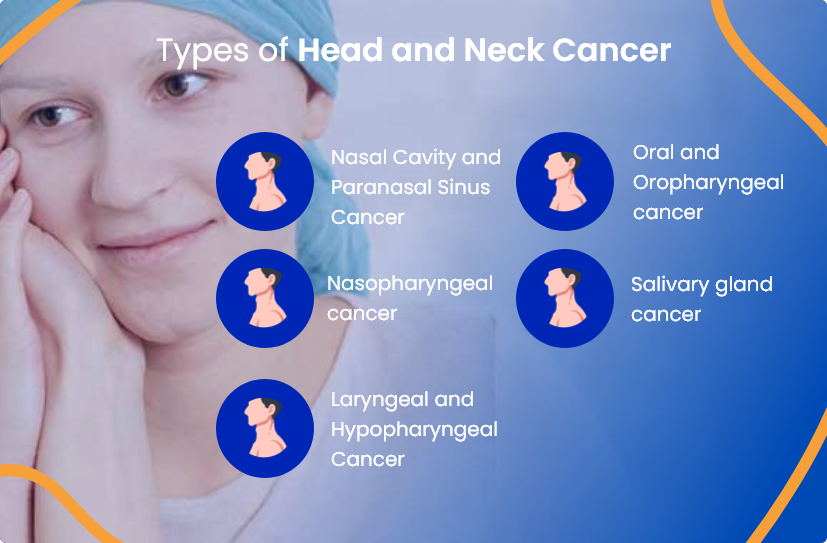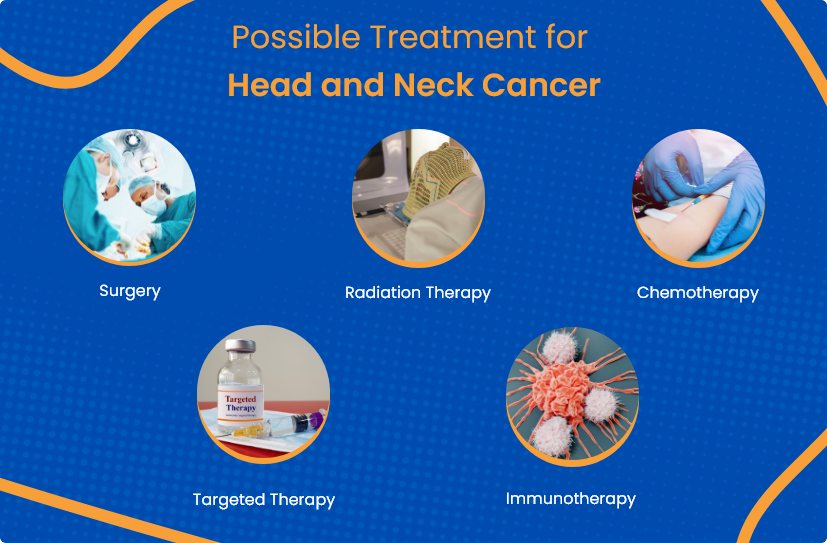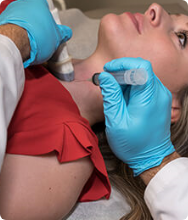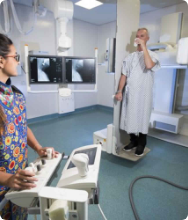
Book a Consultation
Thank you!
Your form has been sent successfully.

According to the American Cancer Society, head and neck cancer refers to a wide variety of malignant or benign tumors that occur in or around the nose, throat, larynx, sinuses, and mouth. It may impair the patient's ability to eat, breathe and swallow and can significantly affect the quality of daily life. Most head and neck cancers are squamous cell carcinoma that develops in the flat squamous cells of the lining of the mouth, throat, and nose. If cancer is found only in the squamous cell layer, it is called carcinoma in situ. If it invades deeper layers, it is called invasive head and neck squamous cell carcinoma.
Based on the location and origin of the cancerous cells, head and neck cancer types can be classified as:

Nasal cavity cancer develops from the cells of the nasal cavity located just behind the nose. Paranasal sinus cancer occurs in the tissues of the paranasal sinus, which are air-filled sacs surrounding the nose.
Oral cancer develops in the cells of the oral cavity, including the mouth and tongue. Oropharyngeal cancer manifests in the middle of the throat and behind the mouth.
It occurs in the cells of the nasopharynx, which are located in the upper part of the throat.
It originates in the tissues of the salivary gland that produces saliva.
Laryngeal cancer occurs in the cells of vocal cords. Hypopharyngeal cancer affects the lower region of the throat.
The symptoms depend on the location and size of the tumor and may include the following:
 Unhealed ulcer
Unhealed ulcer
 Red or white patch in the mouth
Red or white patch in the mouth
 Lump in the head and neck area
Lump in the head and neck area
 Persistent Sore throat
Persistent Sore throat
 Hoarseness
Hoarseness
 Long-term nasal obstruction or congestion
Long-term nasal obstruction or congestion
 Nose bleed or unusual nasal discharge
Nose bleed or unusual nasal discharge
 Difficulty in breathing
Difficulty in breathing
 Double vision
Double vision
 Weakness or numbness in any part of the head and neck region
Weakness or numbness in any part of the head and neck region
 Pain or difficulty in chewing or swallowing
Pain or difficulty in chewing or swallowing
 Pain in jaw or tongue movement
Pain in jaw or tongue movement
 Blood in saliva or cough
Blood in saliva or cough
 Loosening of teeth
Loosening of teeth
 Unexplained weight loss and fatigue
Unexplained weight loss and fatigue
 Ear pain and infection
Ear pain and infection
Head and neck cancer treatment options depend on the type and stage of cancer and the patient's overall health.

Head and neck cancer specialists surgically remove the tumor with some surrounding healthy tissue. The extent of surgical removal depends on the size and spread of the cancer.
Radiation therapy uses high-intensity radiation to destroy cancerous cells. It is mainly used after the surgical removal of the tumor to eliminate any leftover microscopic cancer cells. Intensity-modulated radiation therapy (IMRT) is a specific type of radiotherapy which effectively delivers radiation to cancerous cells and spares healthy cells, thereby reducing the side effects of the treatment.
Chemotherapy uses anti-cancer drugs injected intravenously or orally, which enter the bloodstream and reach and destroy rapidly growing cancer cells.
Targeted drug therapy explicitly targets specific cell proteins or genes that block the growth and spread of cancer. It causes fewer side effects and spares healthy cells because of its specific action.
Immunotherapy treatment, also called biologic therapy, uses a specific protein to enhance the patient's immune system cells' ability to target and destroy cancer cells.
The following tests and procedures may be recommended depending on the symptoms of head neck cancer, age, and general health of the patient:

The head and neck specialist gently inserts a thin, lighted, and flexible tube called an endoscope through the nose into the throat to examine the structures inside the neck. Anesthesia is administered before the procedure to prevent pain and gagging.

A biopsy provides a definitive diagnosis of cancer. The procedure involves the removal of a tissue sample for microscopic examination. A biopsy can be performed using a fine needle to remove tissue fluid or cells from the suspicious area (FNAC) or surgical removal of a part of the tumor.

A biomarker test is a molecular test that identifies specific genes, proteins, and other factors unique to head and neck cancer.

X-rays are taken after the patient swallows a liquid containing barium. Barium coats the esophagus, stomach, and intestines and appears highlighted in white on X-ray film. It provides a detailed view of the organs and helps to determine any abnormalities.

High-intensity radiation is used to produce detailed 3-dimensional computerized images. They are used to locate and measure the tumor's size. Various imaging tests used are:
The cancer specialists at ACTC in Florida offer outstanding patient care by prescribing personalized and evidence-based treatment plans tailored to individual patients' needs. We aim to foster a positive environment that focuses on physical and mental health throughout a cancer patient's journey.
The following are our providers who you can consult at ACTC:

MD, Hematology & Oncology

MD, Ph.D., Hematology/ Medical Oncology

MD, Radiation Oncologist

If you or a loved one has been diagnosed with head and neck cancer, a detailed discussion with your primary physician will help you understand your condition better. Your primary care doctor can then refer you to an advanced specialty center, such as ACTC in Florida.
As one of Florida's best cancer centers, we understand how a cancer diagnosis and therapy impact a person's physical and emotional well-being. Therefore, we work hard to make patients and their families feel secure. We understand how imperative it is for you and your loved one to make informed choices and play an active part in your medical care. We at ACTC strive to support you at every step of diagnosis, staging, treatment, and long-term follow-up in one convenient location. Our cancer specialists are backed up by qualified clinical staff with over two decades of experience and a reputation for providing personalized head and neck cancer treatment.
Schedule a consultation by calling
 352-345-4565
352-345-4565
According to the American Society of Clinical Oncology, head and neck cancer accounts for 4% of all cancers in the United States, and it occurs more commonly in men than women.
The two main risk factors for head and neck cancer are the use of tobacco and increased intake of alcohol. Other risk factors include prolonged sun exposure, viral infections, poor oral hygiene, weakened immune system, and previous history of head and neck cancer.
According to the National Library of Medicine, the most common site is the oral cavity which accounts for 37.3% of all head and neck cancer cases.
If you are based in (or near) Florida, you can schedule a consultation with an ACTC head and neck cancer specialist by calling 352-345-4565 or completing the online form here. (we can provide a link to the form here)
Schedule a consultation by calling
 352-345-4565
352-345-4565